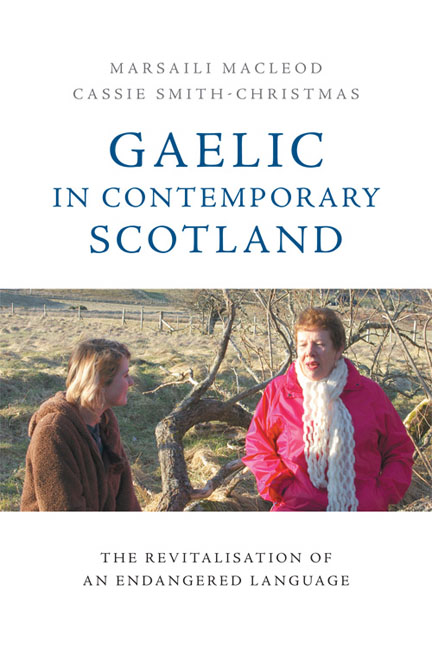Book contents
- Frontmatter
- Contents
- List of Figures
- List of Tables
- Notes on Contributors
- Foreword: Assailed yet Resolute
- Acknowledgements
- List of Abbreviations
- 1 Introduction
- 2 The Language of the Playground: Activists Building Consensus on the Language Policy and Ethos of a New Gaelic Immersion School
- 3 Mismatches between National and Local Gaelic Development: Cròileagan Dùn Èideann and the Promotion of Gaelic-medium Education
- 4 Gaelic amongst Schoolchildren: Ideas on Language Change and Linguistic Choices in Gaelic
- 5 When School is Over and Done With: Linguistic Practices and Sociodemographic Profiles of Gaelic-medium Educated Adults
- 6 New Speakers of Gaelic: A Historical and Policy Perspective
- 7 Learning Gaelic in Adulthood: Second Language Learning in Minority Language Contexts
- 8 Dlùth is Inneach: Charting Language Ideology in the Contemporary Gaelic World
- 9 Gaelic Language Use in Public Domains
- 10 Planning for Growth: The Professionalisation of the Taskforce for Gaelic Revitalisation
- 11 Organisational Language Planning: Gaelic Language Plans in the Public Sector
- 12 The Future of Gaelic Language Revitalisation in Scotland
- Index
12 - The Future of Gaelic Language Revitalisation in Scotland
Published online by Cambridge University Press: 18 December 2019
- Frontmatter
- Contents
- List of Figures
- List of Tables
- Notes on Contributors
- Foreword: Assailed yet Resolute
- Acknowledgements
- List of Abbreviations
- 1 Introduction
- 2 The Language of the Playground: Activists Building Consensus on the Language Policy and Ethos of a New Gaelic Immersion School
- 3 Mismatches between National and Local Gaelic Development: Cròileagan Dùn Èideann and the Promotion of Gaelic-medium Education
- 4 Gaelic amongst Schoolchildren: Ideas on Language Change and Linguistic Choices in Gaelic
- 5 When School is Over and Done With: Linguistic Practices and Sociodemographic Profiles of Gaelic-medium Educated Adults
- 6 New Speakers of Gaelic: A Historical and Policy Perspective
- 7 Learning Gaelic in Adulthood: Second Language Learning in Minority Language Contexts
- 8 Dlùth is Inneach: Charting Language Ideology in the Contemporary Gaelic World
- 9 Gaelic Language Use in Public Domains
- 10 Planning for Growth: The Professionalisation of the Taskforce for Gaelic Revitalisation
- 11 Organisational Language Planning: Gaelic Language Plans in the Public Sector
- 12 The Future of Gaelic Language Revitalisation in Scotland
- Index
Summary
Introduction
Individually and collectively, the chapters in this collection offer empirically rich and compelling insights into the modern Gaelic community and language planning initiatives. The cases examined here have shed light on the complex processes and patterns of Gaelic language acquisition, use and management across a range of spaces of interactions: in the community, in public organisations and in educational settings. Gaelic continues to be classified as ‘definitely endangered’ in the UNESCO Atlas of the World's Languages in Danger (Moseley 2010) on account of weak intergenera-tional transmission of Gaelic in the home. The contributions here clearly illustrate, however, that the decline of Gaelic as a ‘mother tongue’ is not necessarily incompatible with Gaelic's maintenance as an additional language used by an expanding bilingual population in private and social domains.
The socio-political status of Gaelic as a minority language plays a fundamental role in the degree of language acquisition, maintenance and use of Gaelic throughout an individual's lifespan, as well as at different geographical scales within Scotland. Central to the findings presented here, therefore, is the national policy for Gaelic, as enshrined in the Gaelic Language (Scotland) Act 2005 and implemented through Gaelic lan-guage plans and initiatives. As Dunbar explains, the overriding purpose of the Act and the National Gaelic Language Plan is the revitalisation of the Gaelic language. Yet the authors in this collection show that, some thirteen years after the ratification of the Act, it is unclear whether this framework is effecting the attitudinal and behavioural change it aims to produce. In this final and concluding chapter we synthesise the main themes which arise from our findings and elaborate the implications for theoretical claims about minority language revitalisation, for language planning and policy, and for future research.
Revitalising Gaelic in Scotland: issues and obstacles
Three cross-cutting issues can be elaborated from the authors’ examinations. The first emergent theme is one of ambiguity: ambiguity over what it means to be a ‘Gael’ in modern Scotland; ambiguity over what revitalisation means in a national context today; and ambiguity over the policy and planning mechanisms best-suited to support the maintenance of a community of Gaelic bilinguals.
- Type
- Chapter
- Information
- Gaelic in Contemporary ScotlandThe Revitalisation of an Endangered Language, pp. 173 - 182Publisher: Edinburgh University PressPrint publication year: 2018



